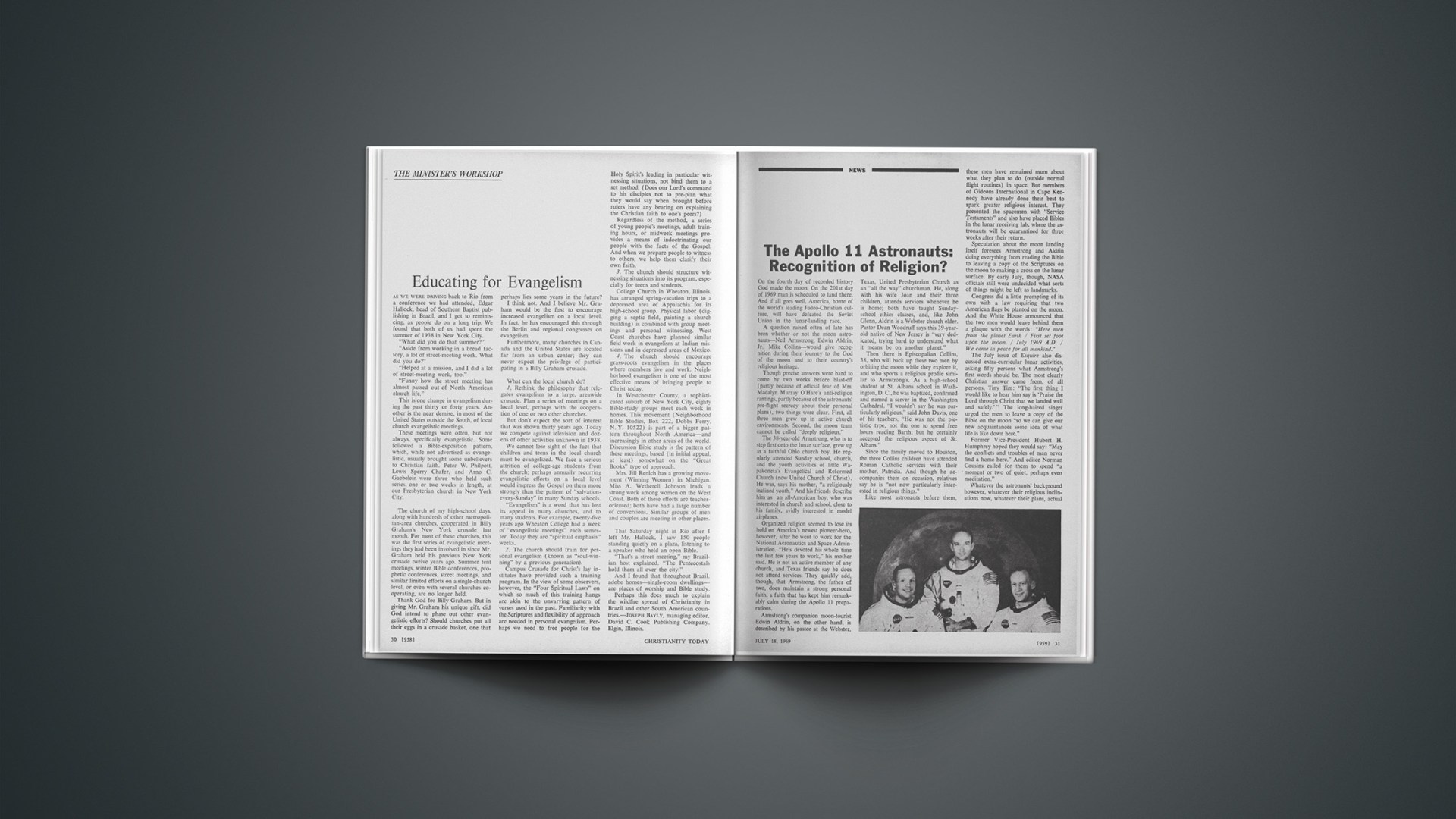On the fourth day of recorded history God made the moon. On the 201st day of 1969 man is scheduled to land there. And if all goes well, America, home of the world’s leading Judeo-Christian culture, will have defeated the Soviet Union in the lunar-landing race.
A question raised often of late has been whether or not the moon astronauts—Neil Armstrong, Edwin Aldrin, Jr., Mike Collins—would give recognition during their journey to the God of the moon and to their country’s religious heritage.
Though precise answers were hard to come by two weeks before blast-off (partly because of official fear of Mrs. Madalyn Murray O’Hare’s anti-religion rantings, partly because of the astronauts’ pre-flight secrecy about their personal plans), two things were clear. First, all three men grew up in active church environments. Second, the moon team cannot be called “deeply religious.”
The 38-year-old Armstrong, who is to step first onto the lunar surface, grew up as a faithful Ohio church boy. He regularly attended Sunday school, church, and the youth activities of little Wapakoneta’s Evangelical and Reformed Church (now United Church of Christ). He was, says his mother, “a religiously inclined youth.” And his friends describe him as an all-American boy, who was interested in church and school, close to his family, avidly interested in model airplanes.
Organized religion seemed to lose its hold on America’s newest pioneer-hero, however, after he went to work for the National Aeronautics and Space Administration. “He’s devoted his whole time the last few years to work,” his mother said. He is not an active member of any church, and Texas friends say he does not attend services. They quickly add, though, that Armstrong, the father of two, does maintain a strong personal faith, a faith that has kept him remarkably calm during the Apollo 11 preparations.
Armstrong’s companion moon-tourist Edwin Aldrin, on the other hand, is described by his pastor at the Webster, Texas, United Presbyterian Church as an “all the way” churchman. He, along with his wife Joan and their three children, attends services whenever he is home; both have taught Sunday-school ethics classes, and, like John Glenn, Aldrin is a Webster church elder. Pastor Dean Woodruff says this 39-year-old native of New Jersey is “very dedicated, trying hard to understand what it means be on another planet.”
Then there is Episcopalian Collins, 38, who will back up these two men by orbiting the moon while they explore it, and who sports a religious profile similar to Armstrong’s. As a high-school student at St. Albans school in Washington, D. C., he was baptized, confirmed and named a server in the Washington Cathedral. “I wouldn’t say he was particularly religious,” said John Davis, one of his teachers. “He was not the pietistic type, not the one to spend free hours reading Barth; but he certainly accepted the religious aspect of St. Albans.”
Since the family moved to Houston, the three Collins children have attended Roman Catholic services with their mother, Patricia. And though he accompanies them on occasion, relatives say he is “not now particularly interested in religious things.”
Like most astronauts before them, these men have remained mum about what they plan to do (outside normal flight routines) in space. But members of Gideons International in Cape Kennedy have already done their best to spark greater religious interest. They presented the spacemen with “Service Testaments” and also have placed Bibles in the lunar receiving lab, where the astronauts will be quarantined for three weeks after their return.
Speculation about the moon landing itself foresees Armstrong and Aldrin doing everything from reading the Bible to leaving a copy of the Scriptures on the moon to making a cross on the lunar surface. By early July, though, NASA officials still were undecided what sorts of things might be left as landmarks.
Congress did a little prompting of its own with a law requiring that two American flags be planted on the moon. And the White House announced that the two men would leave behind them a plaque with the words: “Here men from the planet Earth / First set foot upon the moon. / July 1969 A.D. / We came in peace for all mankind.”
The July issue of Esquire also discussed extra-curricular lunar activities, asking fifty persons what Armstrong’s first words should be. The most clearly Christian answer came from, of all persons, Tiny Tim: “The first thing I would like to hear him say is ‘Praise the Lord through Christ that we landed well and safely.’ ” The long-haired singer urged the men to leave a copy of the Bible on the moon “so we can give our new acquaintances some idea of what life is like down here.”
Former Vice-President Hubert H. Humphrey hoped they would say: “May the conflicts and troubles of man never find a home here.” And editor Norman Cousins called for them to spend “a moment or two of quiet, perhaps even meditation.”
Whatever the astronauts’ background however, whatever their religious inclinations now, whatever their plans, actual contact with the silver sliver in the sky will probably bring them face to face with questions of ultimate truth. “That’s why you really can’t tell what their faith is like,” said Davis. “If I were going to the moon, I’d want a little bit more than the memories of high-school religion.”










